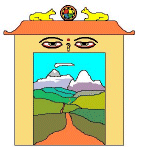
|
The Namche Conference: May 24-26,
2003 Participants and Presentations:
Dr. Vasant Kabir Saberwal |
|
Dr. Vasant Kabir Saberwal (New Delhi, India) Director, Moving Images (e-mail: moving@vsnl.com) and Mr. Sanjay Barnela (New Delhi, India) Creative Director, Moving Images (e-mail: moving@vsnl.com
Film Synopsis 1: Turf Wars: Conservation Claims in the Great Himalaya National Park
In 1999, the Great Himalaya National Park, in the Kullu Valley of the state of Himachal Pradesh, in northern India, was finally notified and brought under the regulations of the Indian Wildlife Protection Act. As a result, local rights to graze animals and extract medicinal herbs within the national park were terminated. Simultaneously, however, a part of the park was deleted from the originally demarcated boundaries of the park, to enable the construction of a hydro-electric power project. Turf Wars explores the contradictions that seem to characterize the government’s policies towards conservation – wherein local livelihoods are expendable in the interests of biodiversity, but biodiversity must make way for national development. In documenting the many twists and turns of the GHNP story over the past couple of years, Turf Wars engages with a number of debates in conservation: Eco-development as the latest recipe for humanizing exclusionary conservation; the nature of scientific evidence, routinely used to support the notion that humans must be separated from nature; the notion of the “oppressive” state further marginalizing “powerless” communities. It is an open-ended film, one that aims to provoke discussion rather than provide answers to problems that are, inevitably, complex, contested and heavily politicized.
Film Synopsis 2: Pastoral Politics: A film about the Gaddi herders of Himachal Pradesh
Migratory and nomadic pastoralism continues to be practiced in many parts of India, particularly the dry lands of the Indian Thar desert and the high ranges of the Indian Himalaya. Over the past century and a half these herding communities have had to deal with restrictive policies of various state forest departments, which see their grazing practices as responsible for large scale land degradation. Whether or not this is the case is difficult to tell, in part owing to a lack of evidence for such degradation, but also owing to the difficulties of establishing what constitutes a state of degradation. Pastoral Politics examines the issue of land degradation in the context of the land use practices of the Gaddi community of Himachal Pradesh. The politics in the title refers first, to the politics that influence individual herder access to grazing resources, and second, to the politics of land degradation, particularly with regard to who frames the discourse on degradation, which specific lands are identified as being degraded and the cultural stereotypes that have historically informed forest department attribution of degradation to herding communities such as the Gaddi. The film suggests that despite the depiction of herding as primitive and inefficient, the Gaddi have continued a successful commercial herding tradition, and that some combination of cultivation and herding may in fact be the most productive uses of these mountain lands. The film calls for a rethinking of Indian conservation policies, and the development of policies that are more accommodating of life-styles such as those of the Gaddi, long considered to be outside the mainstream of Indian society, in need of direction to help modernize. |
Email: info@namche.net
